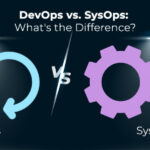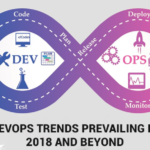Overview
The DevOps Model has been implemented for a variety of product development projects over the past decade. A comparatively recent compound group of techniques has shown significant growth in popularity, with a market value of $8 billion in 2022. In IT operations and software development (Dev), the term “DevOps” (Ops) emerged.
Gene Kim, John Willis, and Patrick Dubois were among the individuals who helped make the phrase popular in 2007. DevOps developed as a result of the collaboration of talented programmers and operational experts in online forums. With DevOps, businesses have expanded and developed their operations in recent years.
Here are some reasons why you should adopt DevOps in your business:
What Are the Benefits of DevOps for Startups?
If your design and development processes are aligned with the DevOps paradigm, they may be effective. Because we understand your hesitancy, we have compiled a few reasons why companies should adopt a DevOps approach. Due to the separation of teams that create the product, organizations that do not employ the DevOps technique frequently develop data silos.
In order to consolidate and combine information, it would be best if you embraced a DevOps Transformation. Furthermore, every project that involves constant updates and deployments must use a DevOps methodology. Rather than lagging behind your competitors, you need to catch up.
You can save money on your projects when you use DevOps for startup companies, as it reduces obstacles and speeds up the launch schedule. Moreover, as DevOps prioritizes customer needs, you will gain valuable insights that will boost the profitability of your company.
In startups, what are the benefits of adopting DevOps?
The benefits of DevOps for startup companies will undoubtedly persuade you to incorporate the new technologies. We will discuss how DevOps can benefit your organization in the following guidelines.
1. Innovation enhanced
Startups can significantly reduce development time by adopting a DevOps model. Consequently, we will need a solution that encourages more innovation quickly, collaborates cooperatively in smaller clubs, and eliminates duplication of effort.
Project development, implementation, and modification will be accelerated. Collaboration allows issues to be dealt with quickly, issues can be made more straightforward, and improvised on the spot, resulting in faster solutions.
2. Saves time
For new organizations, one of the main benefits of DevOps is speed. Collaboration and interaction are fostered by the DevOps-managed services to speed up the innovation process. Code deployments into the manufacturing environment are increased by the production and operational teams.
Businesses must wait between three and six months between the requirement and the availability of a product when using the traditional technique. Using DevOps, startups may be able to shorten the round to their daily cycle.
A discharge cycle that occurs instantly in some circumstances. By delivering superior results and saving time, continual creation and delivery will give your business a competitive edge.
3. Improved Interaction
The goal of DevOps Managed Services is to improve the ability of the two specialties to work together. A company can gain a considerable advantage by reducing their disparities rather than eliminating them. The software design process is modernized so that the culture prioritizes group achievement over individual achievement.
When software and operational teams are trusted and understood, they can explore, investigate, and produce more effectively. Throwing a whole application at a wall and hoping for the best is no longer an option. As each team member works towards the same goals, the application framework becomes more fluid.
4. Failures are reduced
DevOps Solutions aims to provide the best technology solutions and an exceptional user experience to target consumers. It is essential that businesses provide it with greater discipline, pace, and adaptability.
Startups benefit from DevOps by offering innovative solutions very quickly, enhancing the user experience.
5. Enhancing employee satisfaction
Instead of promoting a rule-based or strength-based company culture, DevOps emphasizes achievement. The result is a reduction in organizational obstacles and an increase in collateralization. Consequently, your business’s efficiency increases as your staff becomes happier and more efficient.
Multitasking and increased productivity are often advantages of DevOps transformations for programmers and operational engineers. As a result, they are better able to understand how their role fits into the larger picture of IT and business organization. The result is that they become more valuable and marketable.
6. A better understanding of the product
A shared understanding of research and development is the most significant challenge for software companies. Many teams receive scant information about the product under the traditional setup.
The DevOps approach, on the other hand, involves multiple teams working together to accomplish various tasks, which enables separate teams to always have additional information about the market from outside their particular and limited field of expertise, making it very easy to comprehend the details regarding the product.
As an example, a programmer may gather information about the product’s performance, allowing him to improve scalability or availability.
What Makes DevOps Different from the Traditional Software Development Approach?
Developers and operational employees rarely communicate in conventional software design methods, and each team has its own agenda. In addition to poor performance, delayed order fulfillment, and poor team communication, this technique has several negative aspects.
DevOps, on the other hand, emphasizes teamwork. Additionally, it integrates the autonomous control of procedures by operations and engineering teams. From building through testing to releasing, it is done throughout the software development process. As a mindset, DevOps encourages effective collaboration and lays the foundation for delivering agile products.
As a DevOps Solutions Company, you are in the business of creating and implementing solutions. DevOps-as-a-Service (DaaS) is used whenever necessary. To align with your company’s goals, you must carefully choose, implement, and modify DevOps practices. The “Three Ways” method is the foundation of DevOps culture.
- The application of systems theory is a key tenet of this approach. The term now encompasses all roles associated with the creation of products, including those of customers.
- A continuous feedback mechanism is incorporated into the “second approach” of the model. In order to speed up response times, it focuses on constant release modifications based on customer feedback.
- DevOps’ third founding force (based on research and education) emphasizes improving interpersonal interactions above procedures and systems.
Let Instacarma Gear Your Business for DevOps Adoption
Get the most out of DevOps for smaller companies by working with Instacarma, a DevOps consulting firm. Instacarma’s experience working with startups and businesses worldwide has allowed us to build a reputation for providing dependable and secure technology services.
The company assisted several startup customers in raising millions in investment by using cutting-edge digital solutions and DevOps software development processes. There are many well-known companies for which Instacarma has produced outstanding results, and you can check out their complete portfolio.
Considering this, why would you choose another DevOps consulting firm when Instacarma, a Software Development Company, is already at your disposal? Contact our professionals as soon as possible.
Conclusion
You will be able to deliver high-quality products faster by implementing DevOps in your development software projects. Through mechanization and creativity, the company’s attitude can also be changed.
As a result of DevOps, projects have higher ROI, higher customer satisfaction, and improved employee performance. As long as the administration agrees to adopt DevOps, your current technology and support staff will become DevOps-ready.
A CI/CD and cooperation are some of the topics that will need to be discussed during a DevOps foster system. In addition to production methods, DevOps stretches beyond just that; therefore, not everyone will enjoy it.
















